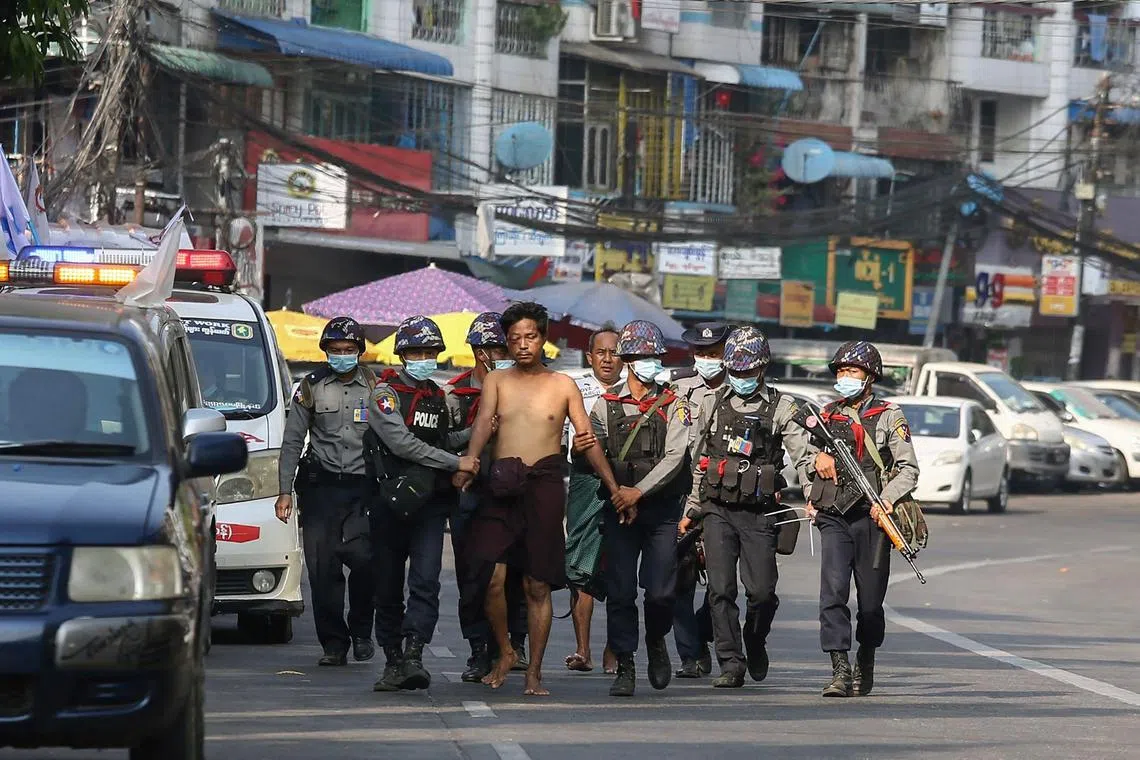Myanmar’s state of emergency extended by six months
Sign up now: Get insights on Asia's fast-moving developments

Myanmar's military government has hinted it may extend a state of emergency and delay new elections.
PHOTO: AFP
BANGKOK – Myanmar’s junta on Wednesday extended the country’s state of emergency by six months, a move likely to delay elections expected by August.
State television on Wednesday evening relayed comments made by junta chief Min Aung Hlaing that his regime needed to ensure the election was held in every part of the country.
The military, which ousted a civilian government in February 2021, is now fighting armed resistance that has flared up in response to its unpopular coup.
It is planning to hold a fresh election to replace the one held in 2020, which it claims was fraudulent. Analysts argue this will only deepen the violence that has gripped the country for the past two years.
On Tuesday, the military-dominated National Defence and Security Council discussed Myanmar’s “unusual situation”, according to state media, and blamed the anti-military group for bombing public places and killing innocent people and intimidating the public.
The same day, the junta-controlled election commission approved registration rules for political parties that would make it difficult for the erstwhile dominant National League for Democracy (NLD) party to challenge military-backed allies.
A new electoral law forbids parties or candidates linked to those declared by the military regime as terrorist groups from standing for election.
The regime has branded the parallel National Unity Government (NUG), which includes ousted NLD lawmakers, a terrorist organisation.
Yangon’s normally busy streets were quieter than normal and its shops lay empty on Wednesday as people stayed home to signal mass opposition to the military on the second anniversary of its coup.
According to Myanmar think-tank Institute for Strategy and Policy – Myanmar, over 7,000 civilians have been killed since the military coup. Some 1.5 million remain displaced across the country, despite Asean’s attempt to lay the groundwork for inclusive political negotiations.
On Wednesday, the NUG called its fight against the military regime “a systematic, unified struggle for our future”.
“The terrorist military council’s attempt to hold a sham election is to hold on to power illegally,” it said in a statement. “As Myanmar’s lawful government, the National Unity Government will make every effort to ensure that all perpetrators, guilty of treason, are brought to justice and that those who have suffered at their hands are legally recompensed.”
Dr Noeleen Heyzer, the United Nations special envoy on Myanmar, on Tuesday urged the international community to expand the delivery of aid, take a stronger unified position on the military’s expected elections, and also increase protection for Myanmar refugees in the wider region.
The United States and some Western countries widened sanctions against the Myanmar regime to mark the second anniversary of the coup.
Australia on Wednesday sanctioned members of the Myanmar military junta, as well as two Myanmar military-controlled conglomerates – Myanmar Economic Holdings and Myanmar Economic Corporation.
These sanctions followed Canada’s action last Friday to ban the export, sale or shipment of aviation fuel to Myanmar.
The US on Wednesday sanctioned the Union Election Commission – which is expected to run in the junta’s coming polls – as well as senior leaders in the Myanmar Oil and Gas Enterprise, which has played a key role in generating revenue for the military regime.
The political crisis has weighed heavily on one of the poorest countries in South-east Asia. Myanmar’s economy is projected by the World Bank to grow by just 3 per cent in the year ending September. This is similar to growth in the preceding year, which has come off an estimated 18 per cent contraction.
The World Bank on Monday noted that the forecast growth would still leave Myanmar’s per capita gross domestic product around 13 per cent lower than in 2019.
This contrasts sharply with the rest of the East Asia and Pacific region, which is recovering well from the effects of the Covid-19 pandemic.
“Economic activity has continued to be disrupted by persistent conflict, which has had devastating impacts on lives and livelihoods, and by electricity shortages,” it said.



